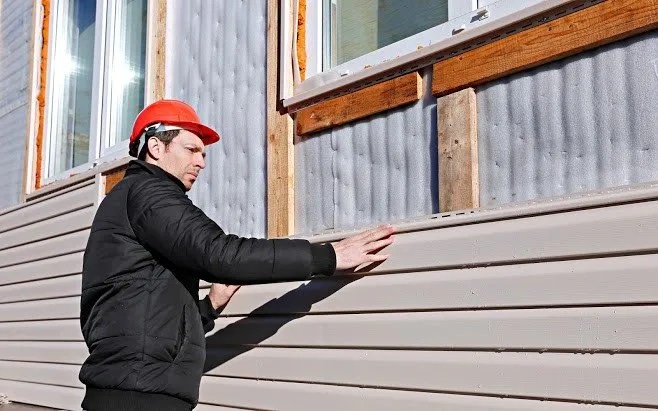Choosing the right siding contractor in Portland is a crucial decision for any homeowner embarking on a renovation or construction project. The siding of your home not only serves as a protective shield against the elements but also significantly contributes to its aesthetic appeal. A well-chosen siding contractor can make a substantial difference in the outcome of your project. In this comprehensive guide, we will explore the essential steps and considerations that will lead you to the perfect siding contractor for your needs.
A. Importance of Siding in Home Renovation
Siding is more than just an exterior covering for your home; it’s a functional and aesthetic component that enhances curb appeal and insulation. Quality siding can improve energy efficiency, increase property value, and provide a fresh look to your residence.
B. The Challenge of Finding the Right Siding Contractor
The real challenge lies in finding a skilled and reliable siding contractor who can bring your vision to life. With numerous options available, it can be overwhelming for homeowners to make the right choice.
C. Key Considerations in the Selection Process
To simplify the process of choosing the right siding contractor in Portland, we’ve broken it down into key considerations, each designed to help you make an informed decision and achieve the desired results.
II. Researching Potential Contractors
A. Gathering Recommendations
Before delving into a specific contractor’s background, start by seeking recommendations from friends, family, and neighbors who have undertaken similar projects. Their firsthand experiences can provide valuable insights.
1. Seeking Input from Friends and Family
Personal referrals often carry significant weight. Gather recommendations from those you trust, especially if they’ve had a positive experience with a siding contractor.
2. Online Reviews and Ratings
Explore online platforms and forums to read reviews and ratings of local siding contractors. Pay attention to both positive and negative feedback to get a balanced perspective.
3. Local Business Associations
Check with local business associations and trade organizations for lists of reputable siding contractors in your area. These affiliations can provide additional credibility.
B. Checking Credentials
Once you have a list of potential contractors, it’s time to delve into their credentials and qualifications.
1. Licensing and Insurance
Ensure that the contractor holds the necessary licenses and insurance coverage required by your state or local regulations. This step is crucial for both legality and accountability.
2. Certifications and Affiliations
Look for contractors who are certified by industry organizations or manufacturers of siding materials. These certifications often indicate a commitment to quality and professionalism.
3. Portfolio of Past Projects
Review the contractor’s portfolio of past siding projects. This will give you an idea of their style, expertise, and the variety of projects they’ve handled.
C. Interviewing Candidates
Narrow down your list and schedule interviews with the remaining candidates.
1. Initial Phone or Email Contact
Initiate contact to discuss your project and gauge their responsiveness and professionalism. This initial interaction can reveal a lot about their commitment.
2. In-Person Consultations
Arrange in-person consultations with each contractor to discuss your project in detail. During these meetings, pay attention to their communication skills and willingness to address your questions and concerns.
3. Asking the Right Questions
Prepare a list of questions to ask potential contractors. Inquire about their experience, the siding materials they recommend, their project timeline, and any unique challenges they foresee for your specific project.
III. Assessing Expertise and Experience
A. Understanding Siding Materials
Understanding different siding materials and their suitability for your home is crucial. A knowledgeable siding contractor should be well-versed in a range of options.
1. Knowledge of Various Siding Options
The right contractor will guide you through siding materials such as vinyl, wood, fiber cement, and more. They will help you choose the material that aligns with your aesthetic preferences, budget, and climate considerations.
2. Specialization in Preferred Materials
If you have a specific siding material in mind, ensure the contractor specializes in it. Expertise in your chosen material means they are more likely to deliver exceptional results.
3. Ability to Offer Custom Solutions
For homeowners with unique preferences, a contractor’s ability to offer custom solutions is essential. Discuss your ideas and assess whether the contractor can accommodate them within the project scope.
B. Evaluating Past Work
Reviewing a contractor’s past projects is a practical way to evaluate their skills and craftsmanship.
1. Examining Completed Projects
Request to see completed siding projects similar to yours. This firsthand look will help you assess the quality of their work and the attention to detail.
2. Contacting Previous Clients
Reach out to past clients if possible. Their feedback can provide valuable insights into the contractor’s reliability, professionalism, and overall experience of working with them.
3. Quality of Craftsmanship
Pay close attention to the quality of craftsmanship in their previous work. Look for signs of precision and a keen eye for detail, which are indicative of a skilled siding contractor.
C. Timeline and Project Management
Efficient project management is essential for a successful siding installation.
1. Estimated Project Duration
Ask each contractor for an estimated project duration. A reliable contractor will provide a realistic timeline and keep you informed of any potential delays.
2. Handling Unexpected Challenges
Discuss how the contractor handles unexpected challenges or changes in the project. Their ability to adapt and problem-solve can significantly impact the project’s outcome.
3. Project Scheduling and Communication
Clear communication and adherence to schedules are key. Ensure the contractor has a system in place for regular updates and progress reports.
IV. Financial Considerations and Transparency
Transparency in financial matters is critical to avoid surprises during the project.
A. Detailed Cost Estimates
Obtain detailed cost estimates from each contractor to understand how the project budget will be allocated.
1. Breakdown of Expenses
A reputable contractor will provide a clear breakdown of expenses, including materials, labor, permits, and any additional costs.
2. Materials and Labor Costs
Ask for specifics regarding the cost of materials and labor. Compare these costs with other estimates to ensure they are fair and competitive.
3. Payment Schedule
Discuss the payment schedule with the contractor. Be cautious of contractors who demand a large upfront payment. A reasonable payment schedule should align with project milestones.
B. Transparency and Contracts
Ensure transparency in all aspects of the project, especially within the contract.
1. Written Agreements
A written contract is essential. It should detail the scope of work, project timeline, payment schedule, warranties, and other essential terms and conditions.
2. Warranty and Guarantees
Understand the warranties and guarantees offered by the contractor, both for materials and workmanship. A reputable contractor should stand behind their work.
3. Legal Compliance
Confirm that the contractor adheres to local building codes and regulations. This ensures that the project is not only completed to your satisfaction but also in compliance with the law.
V. Making the Final Decision
A. Weighing Pros and Cons
Now that you have gathered all the necessary information, it’s time to weigh the pros and cons of each contractor.
1. Comparing Contractors
Compare the contractors based on their credentials, expertise, past work, and financial terms. Consider which one aligns best with your project’s requirements.
2. Aligning with Personal Preferences
Consider how well you connect with the contractor on a personal level. Trust and communication are essential for a smooth project.
3. Trust and Confidence
Ultimately, choose the contractor with whom you feel the most trust and confidence. Your comfort with the contractor’s abilities and professionalism is paramount.
B. Signing the Contract
Once you’ve made your decision, review the contract thoroughly and ensure you understand all its terms and conditions.
1. Understanding Terms and Conditions
Seek clarification on any aspects of the contract that are unclear. It’s essential that both parties fully understand and agree to the terms.
2. Confirming Project Timeline
Double-check the project timeline and ensure it aligns with your expectations and schedule.
3. Finalizing Payment Arrangements
Confirm the payment schedule and ensure it complies with your budget and financial plans.
Moreover, in the world of home renovation, choosing the right siding contractor in Portland is a critical step toward achieving the dream look and functionality for your home. With careful research, thorough assessments, and clear communication, you can confidently select a siding contractor who will bring your vision to life. By following the steps outlined in this guide, you’ll not only enhance your home’s aesthetics but also ensure its long-term durability and value.
The peace of mind that comes from choosing the right siding contractor in Portland is immeasurable. You can look forward to enjoying the transformation of your home, knowing that you’ve made an informed decision and entrusted your project to skilled hands. Your home will not only be shielded from the elements but also exude beauty and charm that will last for years to come.










